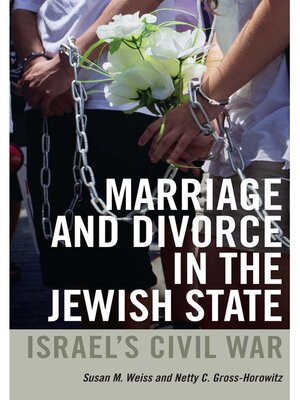Marriage and Divorce in the Jewish State
ebook ∣ Israel's Civil War · Brandeis Series on Gender, Culture, Religion, and Law
By Susan M. Weiss

Sign up to save your library
With an OverDrive account, you can save your favorite libraries for at-a-glance information about availability. Find out more about OverDrive accounts.
Find this title in Libby, the library reading app by OverDrive.



Search for a digital library with this title
Title found at these libraries:
| Library Name | Distance |
|---|---|
| Loading... |
Israel currently has two recognized systems of law operating side by side: civil and religious. Israeli religious courts possess the exclusive right to conduct and terminate marriages. There is no civil marriage or divorce in Israel, irrespective of one's religious inclinations. All Muslims must marry and divorce in accordance with shariya laws, all Catholics in accordance with canon law, and all Jews in accordance with Torah law (halakha). The interpretation and implementation of Torah law is in the hands of the Orthodox religious establishment, the only stream of Judaism that enjoys legal recognition in Israel. The rabbinic courts strenuously oppose any changes to this so-called status quo arrangement between religious and secular authorities. In fact, religious courts in Israel are currently pressing for expanded jurisdiction beyond personal status, stressing their importance to Israel's growing religious community. This book shows how religious courts, based on centuries-old patriarchal law, undermine the full civil and human rights of Jewish women in Israel. Making a broad argument for civil marriage and divorce in Israel, the authors also emphasize that religious marriages and divorces, when they do occur, must benefit from legislation that makes divorce easier to obtain. Making this issue their focal point, they speak to a larger question: Is Israel a democracy or a theocracy?







